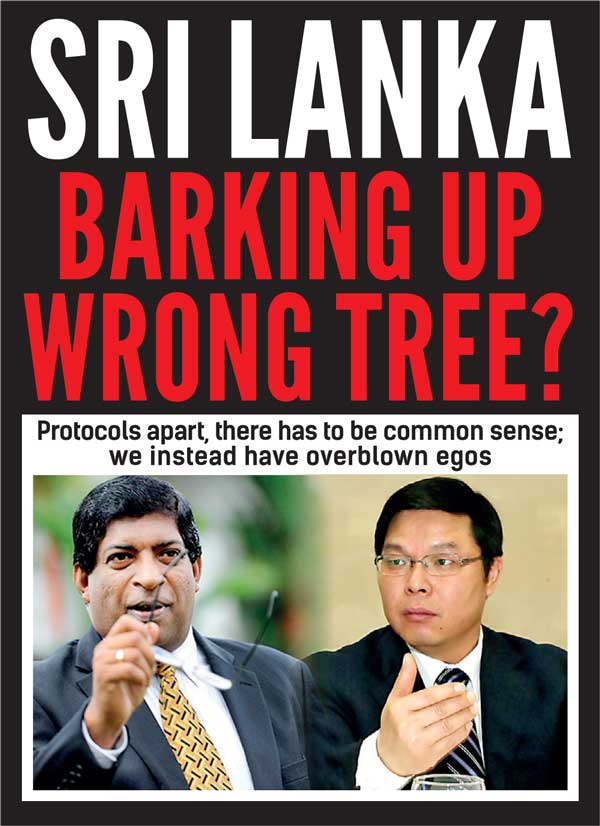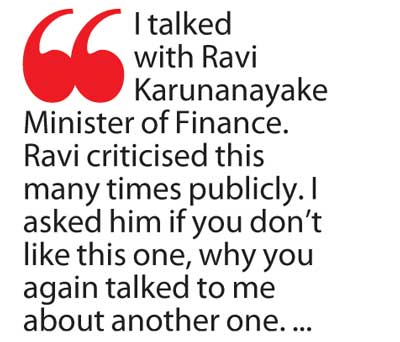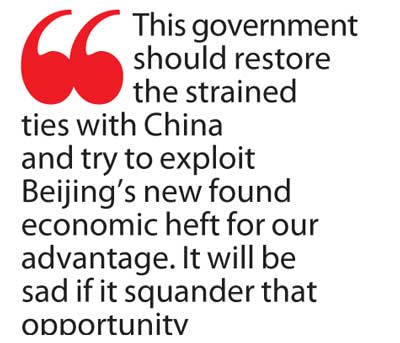Reply To:
Name - Reply Comment
Last Updated : 2024-04-16 13:22:00

 Perhaps the Foreign Ministry is barking up the wrong tree.
Perhaps the Foreign Ministry is barking up the wrong tree.
This time, it is China. All that began with certain remarks made by the Chinese Ambassador in Sri Lanka Yi Xianliang at a press conference last week. The Chinese envoy, responding to a question contradicted Finance Minister Ravi Karunanayake over the latter’s claim that the Chinese loans were expensive.
“I talked with Ravi (Karunanayake) Minister of Finance. Ravi criticised this many times publicly. I asked him if you don’t like this one, why do you again talked to me about another one. Because all the Chinese business people complain to the government, why the Chinese Government grants loans at two per cent, but for them, at least five per cent. That is really unfair. I talked with some close friends in Sri Lanka. Sri Lanka people and Government should have some attitude to the Chinese Government,” he is quoted as saying in the transcript of the media briefing published in the Sunday Times.
He then went on to add, in an answer to a second question: “…If you have any comparison. I checked with Ravi. Last year you got some money from the European countries – I think 50 million dollars at 5.8 per cent. Some people say this is a cheap loan, but they say two per cent is expensive. Do you think this is fair or unfair?”
He also alluded to internal political differences in the country, and added, “That is not my issue. We insist on no intervention into the internal affairs of any country, particularly Sri Lanka as our friend.”
None of that sounds like a major affront, except only that the Chinese diplomats in the past had not been plain talking (Even this much) in public.
However, we have shut up and listened to a fair bit of condescending talk from the Americans, EU and even morally highflying and otherwise insignificant Scandinavians.
That makes me wonder about this overly enthusiastic diplomatic censure of the Chinese envoy – The Sunday Times reports that the foreign ministry will summon this week the Chinese envoy to express ‘deep displeasure’ of the government.
 In terms of diplomatic protocols, that may be fair enough; host Governments summon the diplomats of foreign countries to express concerns about things they are at odds with.
In terms of diplomatic protocols, that may be fair enough; host Governments summon the diplomats of foreign countries to express concerns about things they are at odds with.
However, diplomacy is also reciprocal. The Chinese diplomacy is a fusion of post Westphalian principles of sovereignty and China’s ingrained values of Confucianism.
The latter places a high premium on interpersonal relationships, and makes the Chinese go an extra mile to make sure their counterparts do not lose face even in the most difficult circumstances.
That may explain why Beijing had been mute, when politics in Colombo went haywire during previous elections, bashing the Chinese for all real and imaginary sins of the former regime, and when Colombo suspended the flagship port city project, mainly on party-political considerations.
Beijing did not summon the Sri Lankan envoy there or go public with its disagreements on any of those occasions. But, that did not mean there had not been a fair bit of strains on the bilateral relationship. Now the latest rhetoric, if put into action would make things worse. More fractures on the relationship would mean we have even lesser chance to secure investment. Protocols apart, there has to be commonsense; we instead have overblown egos.
This Government committed a major foreign policy miscalculation; fair enough, partly due to our historical, even somewhat healthy obsession with the friendship with the West. We thought after the ouster of the Rajapaksa regime, good Samaritans from America and Europe would arrive in with bags full of cash, pumping money into development projects.
We even went to the extent of suspending, under the pretext of review, the Chinese funded projects, hoping Americans would take them over. But they did not.
All we have received from the US and the EU is good behaviour certificates, and photoshoots of some beaming US or EU big-shot with Foreign Minister Mangala Samaraweera.
Nice. But, that goodwill has not translated into our economic growth. Our economic growth plummeted from 7 percent in the Rajapaksa presidency (Save his last year) to below 5 per cent.
Last year the economy grew at just 4.8 percent and was projected to remain unchanged this year according to the World Bank. (The second quarter growth was meagre 2.6 per cent).
The only country in the Western bloc that has pledged any worthwhile investment aid is Japan, which has however been a regular donor for decades.
 There was a time when a host of countries in East and South East Asia climbed up the economic ladder with the help of American investments and technology transfer, for the simple merit of them being a bulwark against communism.
There was a time when a host of countries in East and South East Asia climbed up the economic ladder with the help of American investments and technology transfer, for the simple merit of them being a bulwark against communism.
There are reasons (not just the defeat of communism) that it would not happen again. The economic power of the international system has steadily been shifting to Asia.
China is the second largest economy in GDP market value (And the largest in PPP).
India is the fastest growing large economy. That was why David Cameron went to China with a horde of trade delegates and signed up to the Asian Infrastructure Bank, against the wishes of the USA, and his successor Theresa May is now in New Delhi in her first post-Brexit foreign visit, seeking trade and investment.
Growing economic heft of China is such that its two State owned banks, China Development Bank (CDB) and the Export-Import Bank of China (China Exim Bank) lend more money annually to developing countries than the World Bank.
Also, China’s Outward Foreign Direct Investment has grown over 10 per cent annual in recent years; In 2014, it was US $ 102.9 billion, a 14 per cent increase from the previous year.
Set against those numbers, what Sri Lanka has got is a drop in the ocean of the Chinese investments, and whether we like it or not, it is where now the money is. Second, technological and economic changes of globalization have created major internal contradictions in the West. Millions of factory jobs lost to Asia and Mexico have created a disgruntled working class, mainly of those lacking college education and have their job mobility impaired.
In any democratic society, politicians are susceptible to societal pressure and even Hilary Clinton who earlier supported the Trans Pacific Partnership (TPP) has gone back on her word.
Thirdly, even despite their best intentions, Western democracies and even the Indian Central Government have limited control over their multi-national corporations, whereas most of China’s large companies are State owned, whose bosses are beholden to the political dictates from the government.
That explains the efficiency in getting Chinese projects in Sri Lanka off the ground. Efficiency of the infrastructure development of the Rajapaksa regime (Which, albeit many unsavory elements of the former regime was a refreshing change from the monumental indecisiveness of his predecessor Chandrika Kumaratunga administration) was partly attributed to the efficiency of his Chinese lenders and constructors. If Sri Lanka is to leapfrog its development, that efficiency matters.
Fourth, the Chinese model of State led infrastructure development as the driver of economic growth has its limits; even China is rebalancing from investment to consumption. However, for a country like ours, which has squandered much of its economic wealth on bloated welfare programs, at the same time actively discouraging local and foreign investment during the first three decades of independence, there is a lot to build before we reach that point.

Sri Lanka is after all is not a large country, big cities in China easily have more than half of our population. A few large investment projects such as Western Region Megapolis, Port City, Hambantota industrial park and the proposed export zone in Trincomalee could decisively change the destiny of the country for better.
However, to get them off the ground, one needs money and we should not antagonize those with deep pockets.
The simple logic in international relations is that countries take decisions driven by their self-interest, mindful of their placement in the international system, and existing and unfolding power configurations within the system.
However, the tragedy in foreign policy in this country has been that it has been a victim of egoistic grand ambitions of political leaders, who went to build larger than life-size persona among equally incompetent third world leaders at the expense of our economic misery.
For decades, we subscribed to a grandiloquent illusion called non-alignment, anti-imperialism and a middle way of economic development, which was proved to be a road to nowhere.
Countries, which had more realistic assumptions of power configurations in the then international system, ‘bandwagonned’ with the US.
Paradoxically the successful economic managers at that time were pro-growth autocrats from South Korea to Chile, who did not give two hoots about moralistic dogmas, but, made sure their people in millions would be lifted from poverty.
All we got out of Non-Alignment and holding a summit here in Colombo in 1976 was offers to send our women to toil in the Middle East as maids. J.R. Jayewardene parted from that myth, but he overdid it when he antagonized India. He reportedly called Indira Gandhi a sacred old cow and the vindictive old lady in return armed and trained Tamil militants. We lost the next three decades for terrorism.
Mahinda Rajapaksa did not have many international friends, however his cosines with China did not go unrewarded, without which we would not have those highways . Allegations of corruption in his regime may be true, however, sometimes, as some economists have argued corruption could serve as efficient grease in the economic wheel, cutting down transaction cost, though that is often to dispute.
This government should restore the strained ties with China and try to exploit Beijing’s new found economic heft to our advantage. It will be sad if it squanders that opportunity.
Follow RangaJayasuriya @RangaJayasuriya on Twitter

Add comment
Comments will be edited (grammar, spelling and slang) and authorized at the discretion of Daily Mirror online. The website also has the right not to publish selected comments.
Reply To:
Name - Reply Comment
On March 26, a couple arriving from Thailand was arrested with 88 live animal
According to villagers from Naula-Moragolla out of 105 families 80 can afford
Is the situation in Sri Lanka so grim that locals harbour hope that they coul
A recent post on social media revealed that three purple-faced langurs near t
09 Apr 2024 - 1 - 1165

10 Apr 2024
09 Apr 2024